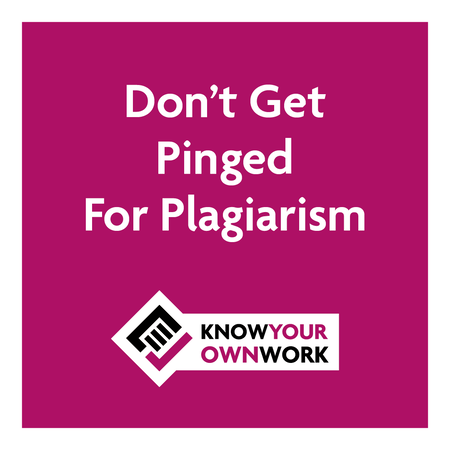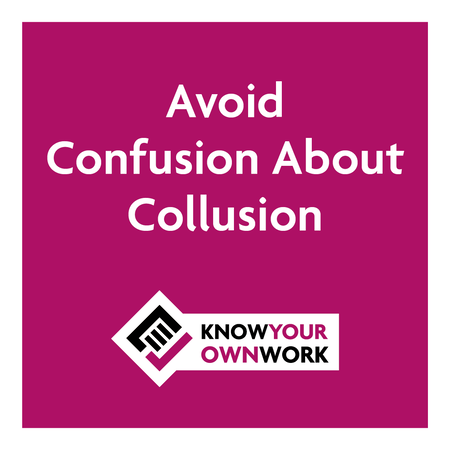The University expects that all students will undertake their studies with integrity and will submit assessments that have been prepared by themselves. To do otherwise, to act dishonestly and cheat in an assessment, is classed as academic misconduct and will incur penalties.
Ensure you understand the meaning of academic misconduct, how you can avoid it and what the penalties are should you act dishonestly.
- Plagiarism
-
Plagiarism means using someone else's work or ideas (whether that is a written source, image, table or graph) and giving the impression that they are your own. Plagiarism also includes the use of generative artificial intelligence tools to generate content without appropriate acknowledgment of the source.
This can be avoided by always acknowledging your sources by referring to them at the point of quoting or paraphrasing (that is expressing the information in your own words). If you are quoting, always remember to use 'quotation marks' to indicate this. It is also important when referencing to use the preferred style within your School.
Plagiarism also covers 'self-plagiarism'. This occurs when you submit an assignment containing materials identical or very similar to work that you have previously submitted for another assessment, whether at this university or another.
If you have published work already (for example, you are a Masters' student) and you want to use material from it, make sure that you cite yourself using the preferred referencing system within your School.
- Generative Artificial Intelligence Tools (GenAI)
-
GenAI tools include tools such as MS Copilot, ChatGPT, DALL-E, DeepSeek, GitHub Copilot, Google Gemini, Midjourney and Perplexity AI.
GenAI tools possess remarkable capabilities, assisting us in creative endeavours and various tasks. however, it can be tempting to use these tools dishonestly. Using GenAI tools such as ChatGPT to generate material for work submitted for assessment, without any form of editing or acknowledgement, will be investigated as a plagiarism offence under the Code of Practice on Student Discipline (Academic).
Remember, the consequences of such actions can be severe—academic penalties, a tarnished reputation, and the erosion of your own skills and learning.
Authenticity and integrity are paramount. Cultivating your unique abilities and personal growth is far more rewarding than short-term gains.
GenAI tools should be used responsibly and ethically, utilising them for idea generation, creativity enhancement, or as learning aids, and you should always reference them correctly. If you are not clear about how or if GenAI tools can be used for a specific assessment, then you should ask your course tutor.
Guidance for students on the use of GenAI tools
- Guidance for Students on the Use of Generative Artificial Intelligence Tools in Education
- Quick Guide on Acknowledging and Citing the Use of GenAI, for supporting students to acknowledge and cite the use of GenAI, where the use of such tools has been permitted
- Quick Guide on Assignment Notes, Drafts and Document Versioning, for supporting students to preserve and demonstrate their thought processes
- Collusion
-
Collusion is defined as unauthorised collaboration between students in an assignment. However, this does not refer to authorised group work (as approved by your tutor) that is assessed by a single group report, or group presentation.
If you are working with others on a project, unless you are told to submit a group report, you must write your own assignment independently: that is, in your own words, your own way of presenting and analysing the data, and your own ideas and arguments.
- Contract Cheating
-
'Contract cheating' is when you submit work that is not your own with the intention of deceiving the marker. For example, this could be an assignment written by a friend, family member, third party or by a commercial service, such as an online essay writing website.
It does not matter whether this has been paid for or not.
Whereas plagiarism is sometimes unintentional, contract cheating is seen as a more deliberate and planned act, and therefore the penalties can be harsher.
- Data Falsification
-
Data falsification involves intentionally altering or fabricating data to support desired outcomes or conclusions.
We understand the temptations and pressures students face, from the pursuit of better grades to the fear of failure.However, the consequences of data falsification are severe - academic penalties, damaged credibility, and the loss of trust. Part of your journey through your degree is about developing your professional ethical approach to work.
Practice responsible research, documenting, and analysing data accurately, following guidelines, seeking advice from tutors, supervisors, mentors.
Academic Integrity Guidance & Resources
All students are strongly encouraged to familiarise themselves with academic integrity guidance provided by the University and how to avoid academic misconduct issues in their coursework and assessments.



